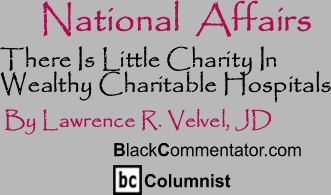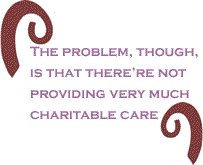
|
||||||||||||||||||||||
 |
||||||||||||||||||||||
 |
||||||||||||||||||||||
 |
||||||||||||||||||||||
 |
| The current issue is always free to everyone |
|
|
 |
Last Sunday Ben Stein wrote on how and why executive pay has skyrocketed in the last 15 years. Among other things he pointed out that last year Lloyd Blankfein of Goldman Sachs made $54 million, though the firm’s stock is now down from $250 per share to $175 per share (or 37 percent). But Blankfein is a mere piker (my view, not Stein’s) compared to Steven Schwarzman of Blackstone. He made over $350 million last year, while the stock is now down 40 percent in the last half year. Nor is either of these guys any great shakes, I note, next to the hedge fund manager, whose name I forget, who made $1.75 billion last year or the year before. Stein laments this kind of legalized evil, saying the sad fact is that “The nation has become, to some at the top, far more of a looting opportunity than a family.” Stein neglectfully forgot to mention, however, that the looters include the Clintons, who, though pikers next to Blankfein or Schwarzman, have done pretty well compared to you and me. During the interregnum between their presidency and their next, hoped-for presidency, they earned a cool $109 million. This is only two years of Blankfein, but maybe about 2,200 years of a normal guy. With regard to herself and her husband, Hillary was wrong when she once said the ’80s were all about getting as much as you can. For those two it has been the years after 2000. Wondering how it has come to pass that The combination of media glamorization, poor
or nonexistent morality, and Friedman/Reagan philosophy is potent,
even irresistible. When unlimited money-hunger pervades the
profit making world, as it does, it will, like In a lengthy article on Friday, April 4th, the Journal discussed the fantastic sums now possessed by supposedly nonprofit, supposedly charitable hospitals - one has “a treasure chest of $7.4 billion, more than many large, publicly traded companies - and the large amounts of revenue they take in each year. “No fewer than 25 nonprofit hospitals or hospital systems now earn more than $250 million a year,” the Journal said.
But there is more to the situation than what you’ve read so far. One of the reasons supposedly charitable, supposedly nonprofit hospitals are amassing huge sums and paying CEOs amounts of compensation like three, four or five million per year or even more, is that the hospitals receive tax exemptions because they are providing charitable care - free care or deeply discounted care - for those who can’t pay. The problem, though, is that there’re not providing very much charitable care. Northwestern, the poster boy example, located in the wealthiest area of Chicago, the so-called Gold Coast neighborhood next to Lake Michigan, is said by the Journal to be exempt from about 50 million in property and sales taxes - not to mention that (like nonprofit universities) it is exempt from taxes on the gains on its cash and investments of $1.82 billion. (One supposedly nonprofit religious hospital, Ascension Health, reported cash and investments of $7.4 billion in 2007). But the percentage of charitable care Northwestern provides - are you ready for this - is “less than 2% of its revenues.” The less than two percent of revenues Northwestern spends on charitable care (or approximately $21 million spent on it) is but “a fraction of what it received in tax breaks.”
Now it is true that there can be situations in which it is proper to call compensation to employees a benefit to the community, e.g., one would think that when a doctor treats an impecunious patient for free, the aliquot portion of the doctor’s salary could properly be thought a community benefit - and would be covered by the amount of “charitable care,” so that BJC would seem to be double counting as well as engaging in evil accounting-slight-of-hand. But not every nickel of every salary can be a “community benefit” as the phrase is meant in the law or else all salaries everywhere, paid by any institution or person, could be a “community benefit” if the institution chose to call itself a nonprofit. This would self evidently be preposterous. But it would have amazing ramifications. Think on it. If every nickel of every salary is a community benefit, then BJC was short changing the communities where it has facilities by paying its CEO “only” $1.8 million. It should have paid him $1.8 billion, not 1.8 million, so that the communities would have gotten about 3.6 billion in benefits, not $937 million. In fact, it should have paid its staff not a paltry $937 million in compensation but $10 billion in compensation, so that it would have provided the communities with about $14 billion, not 1.8 billion, in benefits.
But let us take this beyond hospitals. If compensation is always and everywhere a community benefit, then Bill Clinton is seriously harming schools, groups, etc. by charging only $250,000 per speech. If he were to charge them one million dollars per speech, he would multiply their benefits four times. Ten million would be even better – they would receive 40 times the benefit. Why not 100 million? - that would be better still because it would be a multiplier of 400. Perhaps we should not be surprised that the Journal
says BJC “won’t count its payroll as a community benefit in
the future because of new” IRS standards that “won’t require
the hospitals to provide any minimum amount of charity care.”
On the other hand - won’t require any minimum amount of charity
care? What is that all about? These are at least supposed
to be charity hospitals, after all. Can these hospitals nonetheless
provide no charity care since there will be no minimum
amount required? (According to the Journal, there are
charitable hospitals that are truly charitable. They
treat the uninsured. Sometimes they pay millions in taxes of
one kind or another. They are struggling financially. And, discussing
two of them in the the Journal says their CEOs make just a bit more than $200,000 per year.)
* * * * *
The foregoing paragraph cries out for a stirring, hope inducing peroration, does it not? I have none to offer. BlackCommentator.com columnist
|
Your comments are always welcome. e-Mail
re-print notice
If you send us an e-Mail message we may publish all or part of it, unless you tell us it is not for publication. You may also request that we withhold your name. Thank you very much for your readership. |
|
| April 10, 2008 Issue 272 |
|
| Executive Editor: Bill Fletcher, Jr. |
| Publisher: Peter Gamble |
| Est. April 5, 2002 |
| Printer Friendly Version in resizeable plain text format format |
 |
 |
 |
| |
| |























 Their
CEO’s, of course, make a pile, far more than the greedy Gordon
Gees who run universities.
Their
CEO’s, of course, make a pile, far more than the greedy Gordon
Gees who run universities.  The
huge tax breaks received by wealthy, supposedly charitable hospitals
are raising eyebrows in Congress and elsewhere because of the
dearth of true charitable care. The vast sums these institutions
take in are going elsewhere than to such care. As is typical
of tax free nonprofits of many types, they put their money into
fabulous buildings - a new Northwestern building sounds far
more like a high class, very expensive hotel with doctors than
a hospital – and, as always, large salaries for administrators.
Then, to meet the requirement that they provide “community benefits,”
“whose most important component is charitable care,” they put
down items that you sometimes cannot believe. A horrid example
of this is BJC Healthcare, which is headquartered in
The
huge tax breaks received by wealthy, supposedly charitable hospitals
are raising eyebrows in Congress and elsewhere because of the
dearth of true charitable care. The vast sums these institutions
take in are going elsewhere than to such care. As is typical
of tax free nonprofits of many types, they put their money into
fabulous buildings - a new Northwestern building sounds far
more like a high class, very expensive hotel with doctors than
a hospital – and, as always, large salaries for administrators.
Then, to meet the requirement that they provide “community benefits,”
“whose most important component is charitable care,” they put
down items that you sometimes cannot believe. A horrid example
of this is BJC Healthcare, which is headquartered in 
 The
fat cat “charitable” hospitals, the ones with huge piles of
cash, the ones who pay fortunes to their executives, have gotten
to be fat cats by using certain strategies. Now that antitrust
enforcement has been in the garbage can for 28 years, they have
merged like crazy and thereby gotten power over prices. They
charge list prices that are several times cost. They focus on
expensive procedures. They engage in a form of arbitrage (which
I always thought was illegal): they issue tax exempt bonds and
use the bond proceeds to buy securities that pay more than the
hospitals are paying in interest on the tax exempt bonds. They
sell patients’ debts to tax collection companies - who are great
fun to deal with, right? They sue the poor, who can’t pay, for
their last nickel or the equivalent. And - just so you don’t
forget - who gets all the money? Well, lots of it goes to the
administrators, just like in for-profit health insurance companies
and just as with university presidents. As the president of
a true nonprofit hospital, and therefore a struggling nonprofit
hospital, said to the Journal, “Nonprofit is a misnomer
- it’s nontaxable . . . . When you’re making hundreds of millions
of dollars a year, how can you call yourself a not-for-profit?”
The
fat cat “charitable” hospitals, the ones with huge piles of
cash, the ones who pay fortunes to their executives, have gotten
to be fat cats by using certain strategies. Now that antitrust
enforcement has been in the garbage can for 28 years, they have
merged like crazy and thereby gotten power over prices. They
charge list prices that are several times cost. They focus on
expensive procedures. They engage in a form of arbitrage (which
I always thought was illegal): they issue tax exempt bonds and
use the bond proceeds to buy securities that pay more than the
hospitals are paying in interest on the tax exempt bonds. They
sell patients’ debts to tax collection companies - who are great
fun to deal with, right? They sue the poor, who can’t pay, for
their last nickel or the equivalent. And - just so you don’t
forget - who gets all the money? Well, lots of it goes to the
administrators, just like in for-profit health insurance companies
and just as with university presidents. As the president of
a true nonprofit hospital, and therefore a struggling nonprofit
hospital, said to the Journal, “Nonprofit is a misnomer
- it’s nontaxable . . . . When you’re making hundreds of millions
of dollars a year, how can you call yourself a not-for-profit?” Last
Saturday a great historian, Joseph Ellis, was at our law school
for a four hour discussion of his terrific new book, American
Creation. The subjects that came up included the extent
to which the founders were simply head and shoulders above the
politicians, and the body politic, of our own day, and whether,
if there were a true national conversation on the subject (and
a plebiscite, I guess), Americans would choose to continue or
to drop the imperialistic foreign policy we have so long and
so disastrously indulged. I think Joe Ellis may be more sanguine
about some of these matters, and about
Last
Saturday a great historian, Joseph Ellis, was at our law school
for a four hour discussion of his terrific new book, American
Creation. The subjects that came up included the extent
to which the founders were simply head and shoulders above the
politicians, and the body politic, of our own day, and whether,
if there were a true national conversation on the subject (and
a plebiscite, I guess), Americans would choose to continue or
to drop the imperialistic foreign policy we have so long and
so disastrously indulged. I think Joe Ellis may be more sanguine
about some of these matters, and about 






